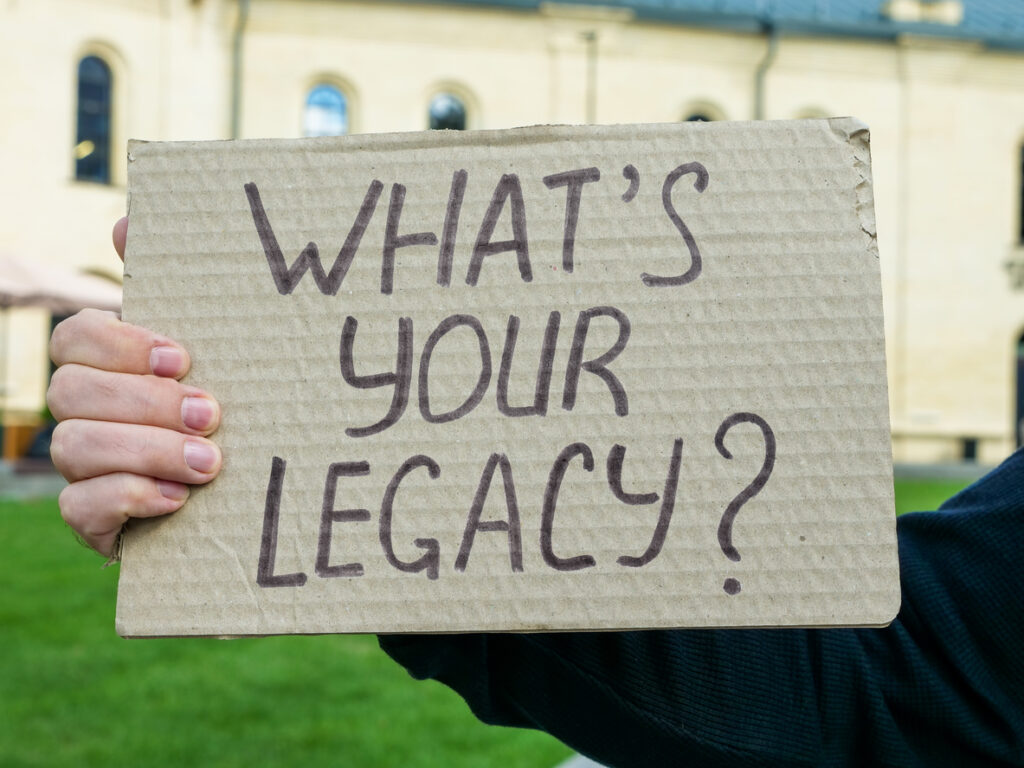Ignore these mistakes, and your legacy could crumble into nothing, leaving future generations unimpressed and uninspired.

You might think your legacy is safe, but some surprising missteps could quietly undo everything you’ve worked for. As a Boomer, your actions today shape how future generations remember you—and it’s not always in the way you hope.
You don’t need fame or fortune to leave a legacy. Every conversation, decision, and habit adds a layer to how your loved ones will carry your memory. But ignoring a few key responsibilities or emotional truths can silently undermine the positive impact you hoped to leave behind. Don’t let that happen. Protect what matters most by steering clear of these 13 overlooked mistakes.
1. You’re Leaving Everything to Chance by Avoiding Estate Planning

It’s common to delay estate planning, especially if you think you don’t have “enough” to worry about. But even modest assets can cause major confusion if you don’t clarify your intentions. Without a will or trust, your family may end up in legal disputes, facing unnecessary stress and costs that could have been avoided with a bit of planning. A thoughtfully crafted estate plan doesn’t just protect your assets—it brings emotional relief and stability to those you leave behind.
More importantly, having a plan communicates your love and care for the people closest to you. You’re giving them guidance during a difficult time and making sure your wishes are honored. Whether you work with an attorney or use trusted planning tools, putting things in writing ensures you’re remembered for your thoughtfulness, not the problems you left unresolved, as stated at AARP.
2. You’re Clinging to Old Beliefs That Alienate Younger Generations

Holding firm to beliefs that no longer serve today’s world can distance you from your kids and grandkids. You may feel like you’re standing by your principles, but sometimes what’s really happening is resistance to growth. If you want to leave a legacy that truly resonates, it helps to listen, adapt, and open yourself to different viewpoints. This isn’t about abandoning your values—it’s about showing that you’re still evolving and willing to meet others where they are.
When you demonstrate emotional flexibility and curiosity, younger people see you as wise and relevant, not rigid and outdated. Even if you don’t agree with every modern trend or idea, your willingness to try and understand speaks volumes. Legacy isn’t just about what you believed—it’s about how you treated others along the way, especially those different from you, as reported at Psychology Today.
3. You’re Ignoring Your Health, and It’s Sending the Wrong Message

Your well-being is more than just a private matter—it sets the tone for how your family approaches their own health. When you skip doctor appointments, ignore symptoms, or live with avoidable health risks, you’re signaling that self-care isn’t a priority. This not only shortens the time you have with your loved ones but sends a message that your legacy doesn’t include modeling vitality and responsibility.
By investing in your health now—through better nutrition, exercise, regular checkups, and stress management—you show that aging can be approached with grace and strength. You lead by example, encouraging those who come after you to value their own health just as much. There’s no greater gift than showing your family what it looks like to live with purpose and self-respect, as mentioned at Mayo Clinic.
4. You’re Not Documenting Your Life Story for Future Generations

You’ve lived through decades of experiences, decisions, and emotions that shaped who you are—but if you don’t record them, those stories risk disappearing with you. Whether it’s through handwritten journals, voice recordings, family photo albums with captions, or digital storytelling, capturing your memories allows future generations to understand your heart, not just your history.
These stories don’t have to be extraordinary. In fact, it’s often the everyday details—your favorite song, the meals your parents cooked, the dreams you had in your twenties—that make your legacy feel most personal. Sharing these glimpses of your life allows loved ones to carry a piece of you forward, building emotional continuity that can span generations. Don’t wait. Your story matters more than you think.
5. You’re Letting Family Conflict Fester Without Resolution

Old grudges and unspoken resentment have a way of lingering far beyond our lifetime. Avoiding difficult conversations might feel like a way to keep the peace, but in truth, it allows pain to take root and spread. If your family is divided by misunderstandings or estrangement, now is the time to step in. Even small gestures—a heartfelt letter, a call, or a sincere apology—can be the beginning of repair.
Leaving behind a fractured family is a burden no one intends. Choosing reconciliation where possible can ripple forward, teaching younger generations the power of forgiveness and healing. You don’t have to resolve everything perfectly, but taking initiative sets a powerful example: that peace and love are more important than pride.
6. You’re Hoarding Possessions Instead of Sharing Meaningful Gifts

Many people hang onto their belongings thinking they’ll pass them down later—but that often leaves family members overwhelmed by clutter instead of touched by sentiment. Instead, consider giving special items now, while you can explain their stories and see the joy they bring. A necklace with a story behind it, a set of tools handed down with advice, or a recipe book annotated with memories—all these are legacy gold.
Gifting in the present creates shared experiences and lasting memories. It also prevents confusion or competition after you’re gone. More than physical items, you’re passing on emotional value. This shift from accumulation to intentional giving helps your family focus on connection, not just stuff.
7. You’re Avoiding Hard Conversations About What You Really Want

It’s understandable to want to avoid talking about illness, end-of-life preferences, or final wishes—it’s heavy and sometimes painful. But silence can create more harm than the topic itself. If your loved ones are left to guess what you would have wanted during moments of crisis, the stress and uncertainty can deepen their grief. By speaking openly now, you remove that burden.
Have conversations about medical directives, funeral preferences, and the values that matter most to you. Write things down and revisit them as needed. These discussions may not feel urgent, but they offer a sense of preparedness and emotional security that will become invaluable when the time comes.
8. You’re Not Investing in Relationships That Truly Matter

Relationships are like gardens—they need tending, especially in later life. It’s easy to assume people know you care, or to get caught up in routine and let time slip by. But meaningful connections are the heart of your legacy. Make the phone call, send the card, invite someone to lunch. These small acts of intention nourish the bonds that outlive you.
Even new relationships can enrich your legacy. Mentoring a younger person, rekindling an old friendship, or deepening intimacy with your partner adds emotional depth to your life. In the end, it’s the people you touched, supported, and stood beside that define the true richness of your story.
9. You’re Spending Carelessly and Risking Financial Ruin for Your Heirs

Enjoying your retirement doesn’t mean ignoring financial responsibility. Excessive spending, poor investments, or avoiding discussions about finances can lead to a legacy of stress and debt for your family. While it’s your right to use your savings, balancing enjoyment with mindfulness ensures that your financial footprint is positive, not problematic.
Make time to review your financial plan. Talk to an advisor, set goals for your estate, and involve your family in appropriate ways. Transparency and foresight go a long way toward preventing heartache. A well-managed inheritance—no matter how modest—speaks volumes about your care and intention.
10. You’re Underestimating the Importance of Teaching Values, Not Just Wealth

Passing on money without passing on meaning can be a recipe for confusion or entitlement. Your core values—like integrity, perseverance, generosity, and resilience—are more enduring than any trust fund. These qualities shape how your family navigates the world, especially when they face challenges of their own.
Tell stories about the lessons life taught you. Reflect with your children or grandchildren about how you’ve handled hardship or success. Write letters that explain your beliefs and why they matter. These are the intangible gifts that will guide your loved ones long after the money is gone.
11. You’re Refusing to Embrace Technology That Could Keep You Connected

Technology can feel foreign or frustrating, but it’s also one of the best ways to maintain relationships with younger generations. Learning how to text, join a video call, or send a photo might seem small, but it builds bridges. It tells your grandchildren that you want to be part of their lives, on their terms too.
Taking time to learn—even just a few functions—shows that you’re not stuck in the past. You’re curious, open, and willing to evolve. Connection doesn’t have to be perfect—it just has to be present. Let tech be a tool, not a barrier, to staying close.
12. You’re Not Supporting Causes That Reflect Your Values

Your legacy doesn’t stop with family. It can also be about the impact you have on your community and the world. Supporting causes that matter to you—whether through donations, time, or advocacy—adds another layer to how you’ll be remembered. It shows you stood for something bigger than yourself.
Whether you support environmental work, education, human rights, or the arts, your contributions create ripples that can last for decades. Align your giving with your passions, and you’ll inspire others to do the same. That’s how legacies become movements.
13. You’re Focusing Too Much on Regrets Instead of What’s Still Possible

Every life has regrets. But dwelling on what you didn’t do—or didn’t do well—can cast a shadow over what you still have time to create. Legacy is a living thing. It doesn’t end until you do. Choosing hope, action, and presence now gives you the chance to add new meaning to the chapters still ahead.
Start that project you’ve been putting off. Say what you need to say. Forgive. Celebrate. Leave behind the richness of a full and evolving life, not a trail of “what-ifs.” It’s never too late to make your legacy a little more luminous.
